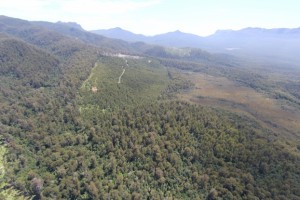 A boost in confidence among northern Tasmanian businesses has been attributed to the plantation forestry and tourism industries. Sources: ABC News, The Clarence Valley Daily Examiner
A boost in confidence among northern Tasmanian businesses has been attributed to the plantation forestry and tourism industries. Sources: ABC News, The Clarence Valley Daily Examiner
The Tasmanian Chamber of Commerce and Industry (TCCI) released its quarterly Survey of Business Expectations. Businesses in the northern region joined those in the south in showing confidence in Tasmania’s economy.
It was one of the first big spikes in business confidence in the north-east since the demise of Gunns in 2012, the TCCI’s chief Michael Bailey said.
“So this has been a long time coming,” he said. “What’s pleasing about that is that if we look deeper into the figures we can see that that growth in confidence is uniform right across different industries in the north.”
Mr Bailey said growth suggested there was more money flowing through the market.
“Which is really pleasing,” he said.
Confidence did spike in the third quarter last year in response to the Chinese president’s visit to Tasmania, but that had largely declined by the second quarter this year.
“We certainly believe this [latest growth] is on the back of forestry starting to return to the north and north-east and money starting to flow back through as those plantation forests open back up again for harvest,” Mr Bailey said.
Strength in the tourism industry was boosting confidence around the state.
North-west businesses were also showing confidence.
“It’s not time to relax yet though, we still know there needs to be a focus on growing wealth-generating businesses in Tasmania, we know that those primary industries really do flow through the economy.”
The survey also asked members whether they had taken advantage of the Federal Government’s instant asset write-off in this year’s budget, which allowed small businesses to claim back purchases of up to $20,000.
Just 20% of respondents said they had taken up the tax break in part or in full, in all three regions and across industry sectors.
Mr Bailey said that figure was surprisingly low and the TCCI had predicted at least half of its member businesses would make use of the scheme. Earlier this year, Caterpillar
Underground Mining announced 280 jobs would go across the region by March.
“We expected after the Caterpillar announcements that there would be a decrease in confidence,” Mr Bailey said. “We’re actually not seeing that playing out.”
Tasmania has seen its fair share of job losses in recent years, mostly within the timber industry. However with the woodchip boom in China – to create pulp and paper products – Tasmania has seen the recent reopening of a woodchip mill near Burnie.
It currently employs 25 people directly and another 100 indirectly, and already the company is talking of expanding to a possible job creation of 400.
According to the Australian Bureau of Statistics the states woodchip and wood exports increased more than 21% in the 204-15 financial year and with China investing billions of dollars into processing plants the boom looks to continue.
Current processing amounts equal close to 750,000 metric tonnes a year however, with plantations being replanted and increasing the yields this amount could come close to 1 million.
This is only possible due to the superb renewable properties of wood. This is a positive sign for the struggling state and if expansions occur, the job creation will have a positive effect on the state’s economy and unemployment levels.





